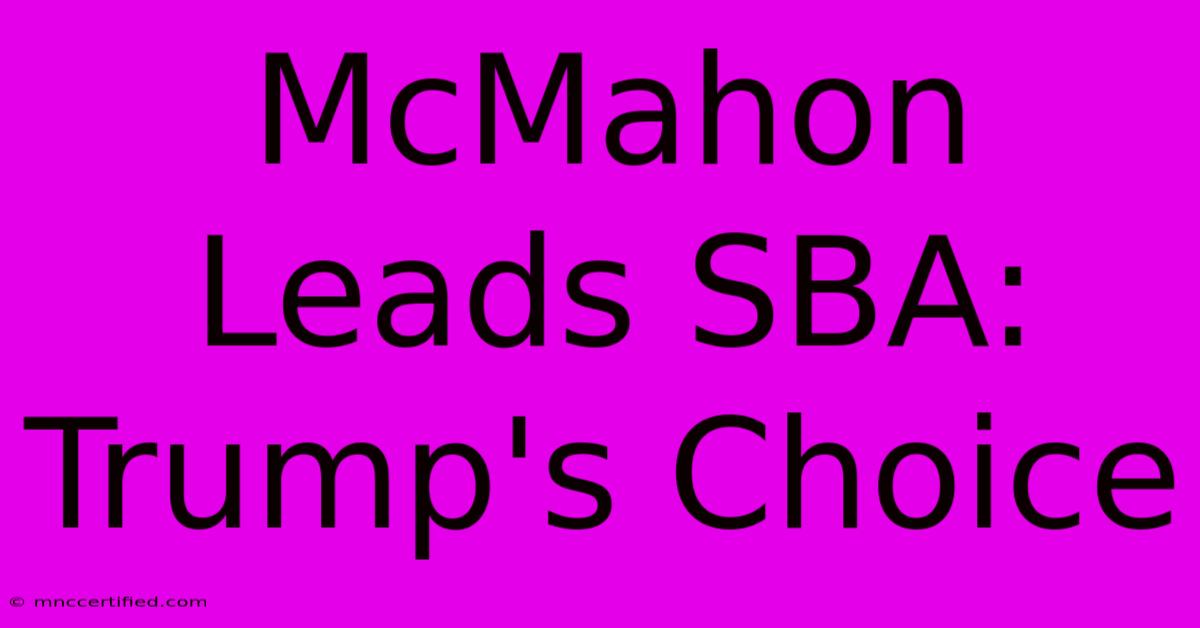McMahon Leads SBA: Trump's Choice

Table of Contents
McMahon Leads SBA: Trump's Choice – A Deep Dive into Linda McMahon's Tenure
Linda McMahon's appointment as head of the Small Business Administration (SBA) under President Trump was a significant event, sparking considerable debate and analysis. This article will delve into her tenure, examining her qualifications, achievements, and the controversies surrounding her leadership. We'll explore the impact of her appointment on small businesses and the broader political landscape.
Linda McMahon: From Wrestling to Washington
Before her role at the SBA, Linda McMahon was best known as the co-founder and CEO of World Wrestling Entertainment (WWE), alongside her husband, Vince McMahon. This background, while unconventional for a government position, provided her with a unique skillset, including experience in business management, marketing, and leadership within a highly competitive industry. Some argued that her entrepreneurial experience was invaluable in understanding the challenges faced by small business owners. Others questioned the relevance of her background to the complexities of government bureaucracy and the specific needs of diverse small businesses across the United States.
Key Qualifications and Experience
While her WWE background was a focal point of discussion, McMahon's qualifications also included:
- Extensive experience in business operations and management: Decades spent building WWE into a global entertainment powerhouse undeniably demonstrated strong business acumen.
- Fundraising and political experience: Prior to her SBA appointment, she had run unsuccessfully for the U.S. Senate in Connecticut, gaining valuable experience in campaigning and fundraising, skills often transferable to navigating the political landscape of Washington D.C.
- Networking and influence: Her high-profile position within the WWE and her connections in the Republican Party provided access and influence within political circles.
McMahon's SBA Initiatives and Accomplishments
During her time at the SBA, Linda McMahon focused on several key initiatives aimed at supporting small businesses. These included:
- Streamlining the SBA loan process: A central goal was to make it easier for small businesses to access capital through SBA-backed loans. This involved efforts to reduce bureaucratic hurdles and expedite approvals.
- Promoting women-owned businesses: McMahon championed programs specifically designed to empower and support women entrepreneurs.
- Focusing on entrepreneurship education and training: Initiatives were launched to improve access to resources and training programs designed to foster entrepreneurial growth.
- Emphasis on veterans and minority-owned businesses: The SBA under McMahon’s leadership continued to focus on assisting veterans and minority business owners, providing them with targeted support and resources.
Successes and Challenges
While some praised her efforts to streamline processes and improve access to capital, others criticized the perceived lack of significant improvements in small business growth during her tenure. The impact of her policies is a subject of ongoing debate and requires further analysis using data from the period. Measuring the success of such initiatives is complex and often depends on various external economic factors.
Controversies and Criticisms
McMahon's appointment and subsequent tenure were not without controversy. Some criticized her lack of traditional government experience, while others questioned the potential for conflicts of interest given her background in the private sector. Furthermore, some critics argued that her focus was overly concentrated on certain aspects of small business development, while neglecting the needs of others.
Conclusion: Evaluating the McMahon Era at the SBA
Linda McMahon's leadership of the SBA under the Trump administration remains a complex and debated topic. While her business acumen and entrepreneurial experience were undeniable assets, her tenure also faced criticisms regarding the effectiveness of her policies and the overall impact on small businesses. Analyzing her legacy requires a nuanced understanding of the challenges faced by the SBA, the broader economic context, and the diverse needs of small businesses across the nation. Further research and data analysis are crucial to providing a complete and accurate assessment of her time as SBA Administrator. Understanding her actions and their impact remains vital to future discussions of SBA leadership and policy.

Thank you for visiting our website wich cover about McMahon Leads SBA: Trump's Choice. We hope the information provided has been useful to you. Feel free to contact us if you have any questions or need further assistance. See you next time and dont miss to bookmark.
Featured Posts
-
Most Expensive Trading Card Steam
Nov 20, 2024
-
Linda Mc Mahon Trumps Education Secretary
Nov 20, 2024
-
World Clown Association Insurance
Nov 20, 2024
-
The Candlestick Trading Bible Pdf
Nov 20, 2024
-
Outback Trading Company Retailers
Nov 20, 2024